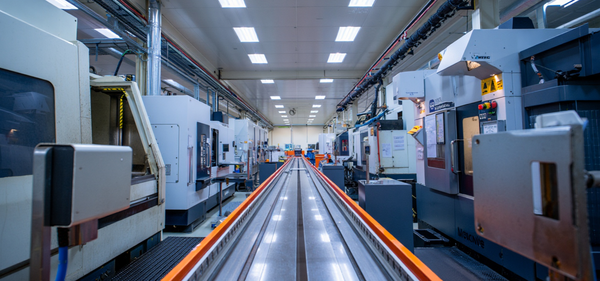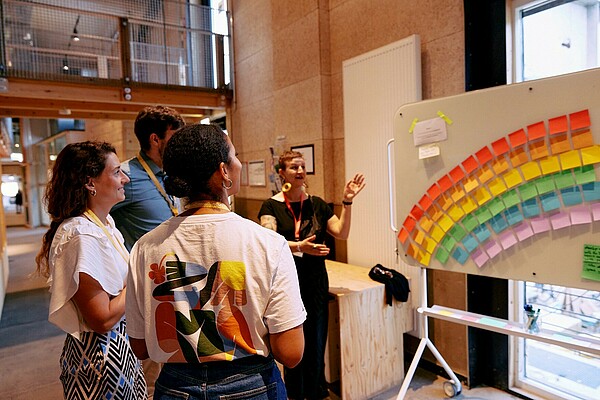Deep Tech Excellence: Berlin's Top Innovators 2025
Discover how five innovative companies are transforming healthcare, quantum tech, and military logistics.
The Berlin Deep Tech Awards continue to showcase the capital's position as a leading innovation hub, recognizing groundbreaking products and solutions that push the boundaries of technology. Since 2015, the Berlin Senate Department for Economics, Energy and Public Enterprises has honored Berlin-based companies and startups for their exceptional contributions to technological advancement. This year's awards celebrate both application-oriented solutions and cutting-edge products that demonstrate high innovation potential and significant future impact. From nearly 100 submissions, 15 teams were nominated across five key technology categories. The final winners were selected by expert juries based on innovation level and market potential, representing the diverse Berlin-based solutions that are shaping tomorrow's technological landscape. Let us introduce these five exceptional winners and their groundbreaking innovations.
Noah Labs: AI-Powered Heart Disease Detection Through Voice Analysis
What if your smartphone could detect heart disease simply by listening to your voice? Noah Labs, winner of the Artificial Intelligence category, has turned this seemingly impossible concept into reality, developing revolutionary AI technology that identifies chronic heart conditions through voice pattern analysis. This non-invasive, cost-effective diagnostic approach has the potential to dramatically reduce hospitalizations and transform cardiovascular care worldwide.
Founded in 2021, Noah Labs leverages deep learning models trained on proprietary audio datasets to detect cardiac decompensation—a critical condition where heart failure worsens rapidly. During cardiac decompensation, pulmonary edema and vocal fold swelling create detectable voice alterations that their AI algorithms can recognize. The company's flagship product, Noah Labs Vox, represents the most advanced algorithm for early cardiac decompensation detection, enabling clinicians to intervene before emergency situations arise.

The technology's impact extends far beyond technical innovation. Early detection translates to longer, healthier lives for patients, reduced emergency visits, and significantly lower healthcare costs for patients, providers, and insurers. Noah Labs benefits from Berlin's rich medical ecosystem, particularly their partnership with the prestigious Charité Berlin, while also collaborating with international institutions like Mayo Clinic and university hospitals in Maastricht and Barcelona. The company's Noah Labs Ark platform is already MDR-certified as a Class IIa medical device, enabling remote monitoring of cardiovascular conditions including heart failure, hypertension, and arrhythmia. With 25 employees across Berlin and Potsdam, Noah Labs recently secured selection for the highly competitive EIC Accelerator program, receiving up to €11 million in funding—placing them among just 71 companies chosen from 1,211 applications worldwide.
Kipu Quantum: Making Quantum Computing Commercially Viable Today
While most quantum computing companies promise future breakthroughs, Kipu Quantum, winner of the Photonics and Quantum Technologies category, delivers quantum advantages today. Their ultra-compact quantum algorithms—up to 10,000 times shorter than conventional approaches—run on existing commercial quantum hardware, making quantum computing practically accessible for industries like logistics, finance, materials science, and artificial intelligence.
Founded by CEO Daniel Volz, physicist Enrique Solano, and deep tech entrepreneur Tobias Grab, Kipu Quantum emerged from a radical insight: quantum computing doesn't need to wait for distant future hardware improvements. Volz's firsthand experience with the limitations of classical computing in complex chemistry simulations, combined with his leadership role in BASF's quantum initiative, led to the company's revolutionary approach. Their proprietary counterdiabatic protocols dramatically compress quantum algorithms, enabling reliable execution on today's quantum processors without requiring mapping to lower-order formulations.
The company's technology solves real industry problems through their PLANQK platform, which already serves over 200 enterprises with cloud-accessible quantum processors—no quantum expertise required. Their approach successfully tackles higher-order unconstrained binary optimization problems, delivering enhanced solution quality with lower resource consumption and reduced circuit depths. This breakthrough enables commercial quantum advantage today, not in the distant future.

Berlin's quantum ecosystem provides Kipu Quantum with access to highly qualified talent, research collaborations, and government support for quantum as a strategically relevant future technology. The company's practical impact is exemplified by their collaboration with Lufthansa Industry Solutions on the QCI QCMobility project, where they're applying quantum algorithms to optimize aircraft rotation, tail assignment, and short-term planning processes—addressing the complex optimization challenges that traditional methods struggle to handle in modern aviation operations.
Labfly: Autonomous Drone Networks Revolutionizing Medical Logistics
Imagine a world where critical medical samples travel through the air rather than through traffic-congested streets. Labfly, developed by Berlin startup DiAvEn and winner of the Robotics category, is making this vision reality through autonomous drone fleets that transform biological sample transport in urban laboratory networks, delivering faster, safer, and more energy-efficient connections between medical facilities.
Founded in 2018 by visionary engineers from TU Berlin, Labfly specializes in healthcare drone delivery services, focusing on laboratory sample transport and medical supply delivery. The company's passion-driven approach stems from their founders' love for aerospace engineering and their vision of bringing sustainable, future-proof flight systems to healthcare logistics. Their custom-developed drones offer exceptional safety and robustness, specifically designed to meet the unique requirements of medical deliveries where stakes are higher than conventional logistics.

The Labfly 1000 drone represents the pinnacle of healthcare delivery technology, featuring two design variants to serve different medical scenarios. The top-loading variant serves hospitals and laboratories requiring landing pad delivery, while the bottom-loading variant enables payload drops for pharmacies without requiring landing. Both variants feature an insulated 1-kilogram payload compartment with 6-liter capacity, constructed from lightweight yet robust foam and fiberglass materials. The drone's unique structural design prioritizes aerodynamic advantages—its retractable legs and beetle-like structure minimize air resistance during flight, optimizing performance for long-distance missions. This innovative approach addresses the critical challenge of transporting sensitive and fragile medical cargo while maintaining the isolation necessary for biological samples. By replacing traditional ground transportation with direct aerial routes, Labfly reduces delivery times, eliminates traffic-related delays, and significantly decreases CO2 emissions while ensuring reliable healthcare supply chains, particularly beneficial for rural regions without on-site personnel.
PRAMOMOLECULAR: Targeted Gene Therapy for Incurable Diseases
What if we could silence disease-causing genes with surgical precision, targeting cancerous mutations while leaving healthy cells untouched? PRAMOMOLECULAR, winner of the Sustainable & Social Impact category, is pioneering this approach through innovative siRNA therapies that offer new hope for treating previously incurable diseases like pancreatic cancer, using patented transport molecules that deliver therapeutic agents directly to specific organs without conventional packaging mechanisms.
PRAMOMOLECULAR develops "self-delivering siRNAs" based on their proprietary platform technology—a highly innovative drug class that efficiently down-regulates disease-causing proteins such as mutated or over-expressed proteins. Their breakthrough lies in solving the fundamental challenge of siRNA delivery: getting these therapeutic molecules into target tissues. While only six siRNA drugs are currently approved worldwide (all targeting liver proteins due to existing liver-specific delivery systems), PRAMOMOLECULAR has developed novel covalently linked, lipid-based delivery molecules that transport nucleic acid-based drugs into lung, heart, and pancreatic cells in vivo.

The company's decisive innovation centers on their delivery method, where two to three fatty acids are coupled to the siRNA's sense strand through special chemical bonds. Depending on the chosen fatty acids and application conditions, they achieve organ preference for lung, pancreas, or heart tissues. This targeted approach enables particularly efficient gene silencing in these organs while achieving additional selectivity by targeting mutated cancer mRNA rather than wildtype mRNA. Their drug candidates address specific KRAS-mutated oncoproteins in non-small cell lung cancer and pancreatic ductal adenocarcinoma, as well as disease-causing proteins in heart failure. The platform's efficiency is remarkable: they can manufacture drug candidates with covalently coupled delivery molecules in fully automated, standardized processes using oligonucleotide synthesizers under pharmaceutical-grade conditions. With two patents filed for their platform technology and an AI-optimized approach to siRNA candidate selection, PRAMOMOLECULAR represents a paradigm shift toward making the vast potential of siRNA therapeutics accessible beyond liver applications, potentially unlocking treatments for numerous previously untreatable conditions.
AFTS: Blockchain-Secured Military Supply Chains
In an era where democratic institutions face unprecedented challenges, what if military supply chains could be made invulnerable to manipulation and disruption? AFTS, winner of the Web3 – DLT, Blockchain, NFT & Metaverse category, leverages Web3 technologies to digitize NATO military supply chains, replacing paper-based processes with encrypted real-time transactions that strengthen the resilience of democratic defense infrastructures, with Berlin providing the ideal environment for connecting defense technology with blockchain excellence.
AFTS (Advanced Future Technology Solutions) operates at the intersection of military logistics and cryptographic innovation, utilizing blockchain infrastructure to secure and optimize NATO's most sensitive supply chain processes. The Berlin startup transforms weeks of paperwork into manipulation-proof real-time transactions, addressing a critical vulnerability in defense logistics. The company's founding story reflects its strategic importance: co-founders Christoph Langewisch and Andreas Hofmann, both experienced in logistics and blockchain technologies, recognized the outdated, paper-based Form-302 customs procedures used by NATO as a security risk that their blockchain expertise could revolutionize.
The platform replaces vulnerable paper documents with decentralized registries that provide complete traceability, eliminate single points of failure, and meet NATO-level security standards. This transformation delivers significant societal benefits: faster availability of critical resources, enhanced operational readiness, and a more resilient democratic defense structure. As a Berlin-based company, AFTS benefits from proximity to EU and NATO institutions, access to specialized personnel, and the capital's security ecosystem.

Founded in 2019, AFTS initially focused on supply chain transparency for sustainability, enabling companies to trace products from source to consumer through their blockchain-based platform. Their solution eliminates "Excel chaos" by centralizing data across organizations, provides continuous supply chain monitoring, and ensures supplier evaluation through certificate verification. The blockchain foundation—built on Ethereum—ensures data integrity and trust between suppliers and buyers, making information available 24/7 without additional operational costs. For AFTS, Web3 technology represents more than digital ownership—it's about protecting democratic integrity at the highest level, transforming critical defense logistics from a vulnerability into a strategic advantage.
Outstanding Finalists: Innovation Beyond the Winners
While five companies claimed the top prizes, the Berlin Deep Tech Awards 2025 highlighted the remarkable depth of innovation emerging from the German capital. Ten additional finalists demonstrated exceptional technological prowess, each contributing unique solutions to their respective fields.
Artificial Intelligence
Photonics and Quantum Technologies
Robotics
Sustainable & Social Impact
Web3 – DLT, Blockchain, NFT & Metaverse
These finalists collectively represent Berlin's innovation ecosystem's breadth and depth, showcasing how the city continues to attract and nurture groundbreaking technological developments across diverse sectors.
Looking Ahead: Berlin's Innovation Pipeline
As we look toward the Berlin Deep Tech Awards 2026, the jury faces an enviable challenge. With Berlin's innovation ecosystem continuing to expand and mature, the selection process promises to become even more competitive. The city's unique combination of world-class research institutions, venture capital, government support, and international talent continues to create fertile ground for breakthrough technologies. From the established tech giants to the emerging startups working in university labs and incubators across the city, Berlin's deep tech pipeline shows no signs of slowing down. Next year's awards will undoubtedly present an even more difficult choice for the expert juries, as they navigate through what promises to be an increasingly impressive array of innovations that could reshape industries and improve lives globally.
---
Photos: © Greta Maria Asgeirsdottir






